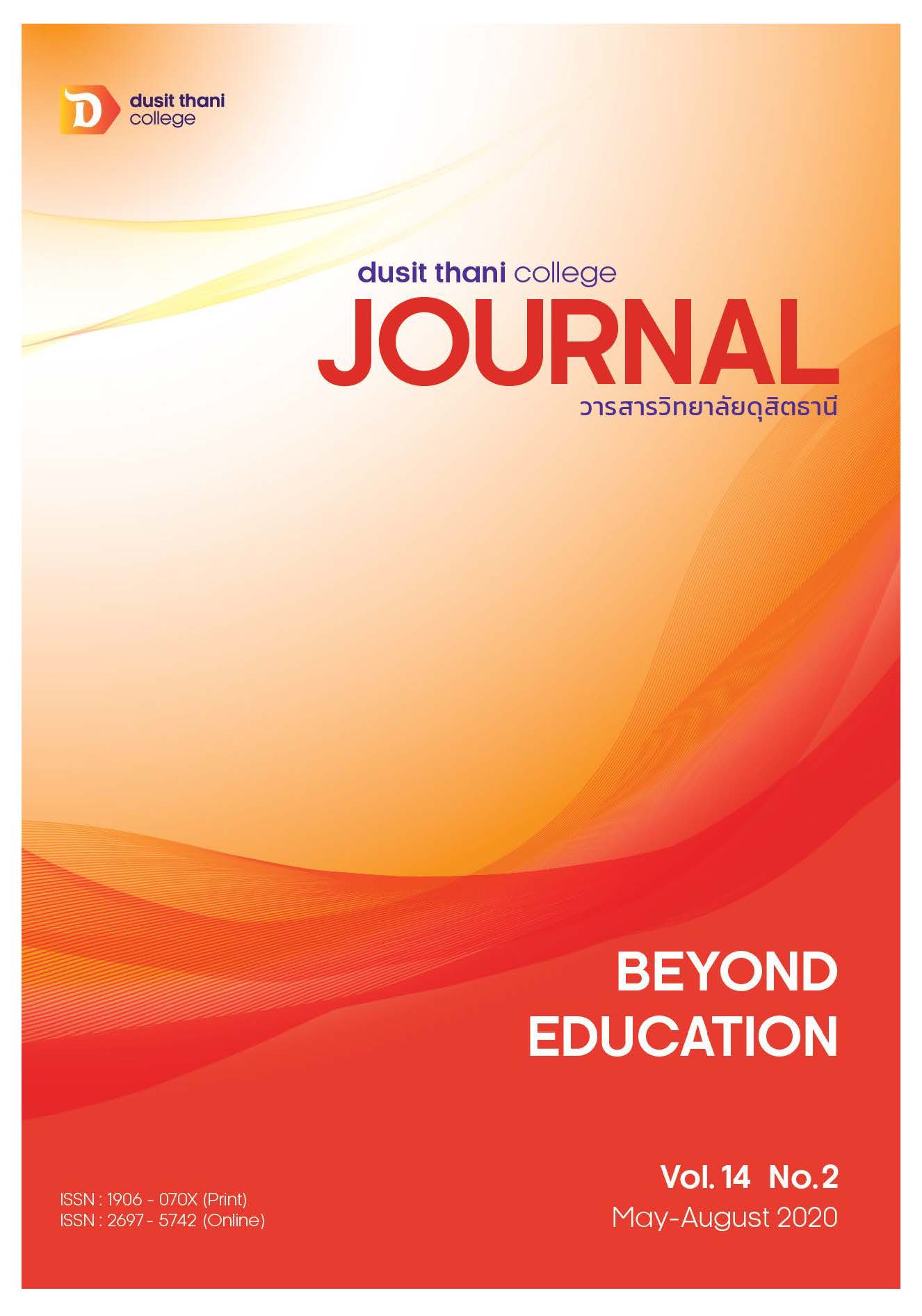Koh-Mak Community People’s Competencies for Low Carbon Tourism Development, Trat Province
Main Article Content
Abstract
This article written with its main purpose of analyzing The Community People’s Competencies for Low Carbon Tourism Development of Koh-Mak. Data was collected from documentary research studies, In-depth Interviews method, and Focus group discussion from 15 key informants, in order to condense conclusions and recommendations. This part of the research conducted with semi-structured interview; questionnaires and non-participant observation method as the research instruments. The competencies affirmed to be core competencies and functional competencies. These two competencies declared to be of benefit to the management and the implementing of low carbon tourism development for Koh-Mak. The core competencies divided into two levels which are organizational level and individual level. The core competencies at organization level comprised of 6 components including 1) Community empowerment 2) Community participation 3) Collaboration between organizations 4) Public support 5) Networking and alliance building and 6) Database and information. At the individual level of core competencies comprised of 3 components which are 1) knowledge 2) skills and 3) attitude. Another competencies that found in this analyzing is functional competencies which have been studied from community people and entrepreneurs of Koh-Mak. Community people have been implementing 8 functions and entrepreneurs implementing 10 functions in the field whereas these functions are the common settings that have been the essential tools to the management and the implementing for low carbon tourism development so called “Community People’s Competencies”.
Article Details
Article Screening Policy
- All research and academic articles to be published must be considered and screened by three peer reviews in the relevant field / article.
- All articles, texts, illustrations and tables published in the journal are the personal opinions of the authors. Editors don't always have to agree. And no responsibility whatsoever is the sole responsibility of the author.
- The articles to be published must never be published. Where did you first publish? And not in the consideration of other journals If the audit found that there has been a duplicate publication It is the sole responsibility of the author.
- Any article that the reader sees as being plagiarized or impersonated without reference. Or mislead the work of the author Please let the journal editor know it will be your greatest blessing.
References
(Public Organization), Cocoon & Co Company Limited.
A. Ahmad, Y. Zhao, M. Shahbaz, S. Bano, Z. Zhang, S. Wang, Y. Liu. (2016). Carbon emissions, energy consumption and economic growth: An aggregate and disaggregate analysis of the Indian economy, Energ. Policy 96, 131-143.
Biggs J.B., and Telfer R. (1987). The Process of Learning. Sydney: Prentice-Hall of Australian 1981, 553-576.
Bower G.H. and Hilgard E.R. (1984). Theories of Learning. Englewood Cliffs, NJ: Prentice-Hall, 647.
Boyatzis, R.E., Leonard, D., Rhee, K., and Wheeler, J.V. (1996). Competencies can be developed, but not the way we thought. Capability, 2(2). P.25-41.
Cai Meng, Wang Yuming. (2010). Low-carbon Tourism: A New Mode of Tourism Development, Tourism Tribune, 1-5.
D. Johnston, R. Lowe, M. Bell. 2005. An exploration of the technical feasibility of achieving carbon emission reductions in excess of 60% within the UK housing stock by the year 2050, Energ. Policy 33. 13, 1643-1659.
D. Zhu, Y. Zhou. (2016). Construction on the low-carbon tourism development mode in national historical and cultural town: a case study of Liye town, Longshan County, Changsha province, Science and Technology Entrepreneurship Monthly 29. 9 (2016) 1-3.
Hamel G. and Prahalad C.K. (1994). Competing for the Future. Harvard Business School Press Boston, Massachusetts.
Huang, C. & Deng, H. (2011). “The model of developing low-carbon tourism in the context of leisure economy”. Energy Procedia Journal. 5, (pp.1974–1978).
H. Hashimab, S. Bakara, J. Lim. (2014). Green industry for low carbon economy: palm oil green assessment tool, Energy Procedia 61, 2759-2762.
K. Kaesehage, M. Leyshon, C. Caseldine. (2014). Communicating climate change - Learning from business: Challenging values, changing economic thinking, innovating the low carbon economy, Fennia 192. 2, 81-99.
Kotler P. (2000). Marketing Management. Englewood Cliffs, New Jersey: Prentice Hall.
McClelland, D.C. (1973). “Testing for Competence Rather than for Intelligence”.
American Psychologist. 28, 1 (March): 1-14.
Paul Peeters, Ghislain Dubois. (2010). Tourism travel under climate change mitigation constraints. Journal of Transport Geography 18, 447–457.
R. Guo. (2013). Study on low-carbon tourism development model of alpine wetland:
a case study of the First Bend of the Yellow River, Technology and Market 1, 89-91.
R. Ramanathan. (2006). A multi-factor efficiency perspective to the relationships among world GDP, energy consumption and carbon dioxide emissions, Technol.
Forecast. Soc. 73.5, 483-494.
Richard S.J. Tol. (2007).The impact of a carbon tax on international tourism.
Transportation Research Part D 12, 129–142.
S. Gssling, D. Scott, M. Hall. (2013). Challenges of tourism in a low-carbon economy,
Wiley Interdisciplinary Reviews Climate Change 4. 6, 525-538.
S. Lechtenbhmer, C. Schneider, M. Roche, S. Höller. (2015). Re-industrialisation and
low-carbon economy-can they go together? Results from stakeholder-based scenarios for energy-intensive industries in the German State of North Rhine Westphalia, Energies 8. 10, 11404-11429.
Stefan Gössling, Brian Garrod,et al. (2010). Food management in tourism: Reducing tourism’s carbon ‘foodprint’. Tourism Management, 1-10.
Spencer, L.M. (1986). Calculating human resource costs and benefits. New York,
NY: John Wiley & Sons.
U.K. Energy White Paper. (2003). Energy White Paper 2003: Our Energy Future: Creating a Low-carbon Economy, London.
Yingfa Yang. 2015. Implementation Strategies of Low-Carbon Tourism. The Open Cybernetics & Systemics Journal, 2015, 9, 2003-2007.
Yuyan Luo, Jun Wang, Qingzhong Dang, and Yao Chen. 2016. Literature Review on Low Carbon Eco-tourism. 3rd International Conference on Management, Education Technology and Sports Science (METSS 2016). Publication at: https://www.researchgate.net/publication/309517892. (2018, December 5).


